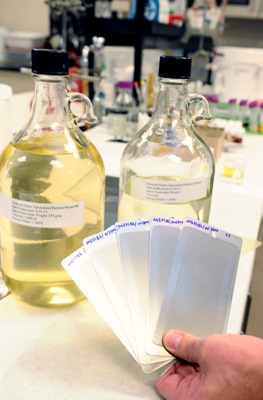The Scientists at the North Dakota State University, in Fargo, have formulated bio-based resins that are different and have the inherent capability to alter the presently utilized resin and coatings technology.
They used resins that are made of renewable raw materials to do away with the use of eco-harming material compounds such as bisphenol-A and formaldehyde.
 North Dakota State University researchers, led by Dr. Dean Webster, have developed biobased resins based on sucrose and vegetable oils which can be varied to perform in many applications, making them ideally suited for biocomposite materials, baking enamels and structural adhesives. NDSU lab tests show significantly improved properties over current biobased materials and processes.
North Dakota State University researchers, led by Dr. Dean Webster, have developed biobased resins based on sucrose and vegetable oils which can be varied to perform in many applications, making them ideally suited for biocomposite materials, baking enamels and structural adhesives. NDSU lab tests show significantly improved properties over current biobased materials and processes.
The NDSU research teams led by Dean Webster, a professor in the Department of coatings and Polymeric Materials and his students have formulated resins based on vegetable oils and sucrose that can be used in diverse type of applications in a range of industries. The researchers have utilized sunflower, flax, plus oil from soybeans, and sugar-beets in the formulation of new resins. They found that the new resins have a considerably improved level of renewable materials; the mechanical properties of the new resins remain similar to that of the materials formulated from petrochemicals and noticeably bettered level of properties over the presently used bio-based materials and procedures.
The newly developed resins by NDSU are furthermore expected to bring down the dependence on materials that use petrochemical as a base in a number of coatings and formulations. The research also has established that epoxidized sucrose ester resins formulated by them fabricate materials that are at least two to four times functionally more efficient than resins that use vegetable oils as base.
The laboratory researches conducted by NDSU has demonstrated that the resins developed utilizing green technology at NDSU have the attributes that are superior to the currently utilized bio-based materials and akin to that of petrochemical- based materials. The developed resin materials can be deployed in a range of usages in electronic, marine, biomedical, architectural, building industries. The resins are combined utilizing reagents and raw materials by utilizing normal industrial processes.